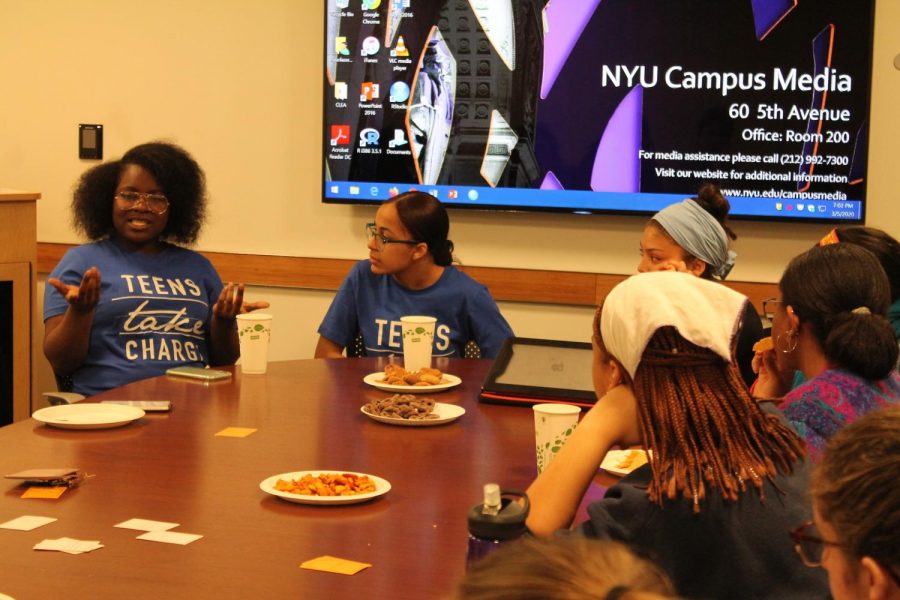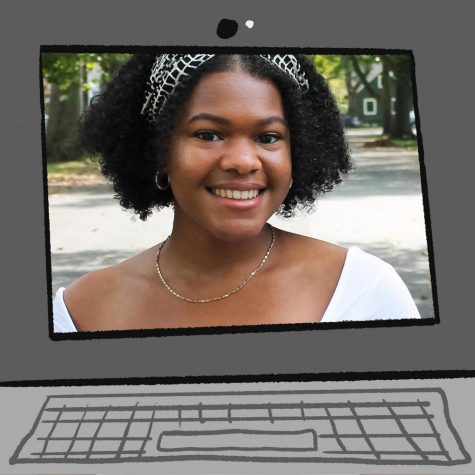Candid conversation created an unexpectedly intimate atmosphere in a small Rubin Residence Hall classroom on Thursday. For 90 minutes, the space was transformed into a forum where nearly 20 students gathered to discuss their feelings regarding a range of issues, most prominently education inequality.
The event was hosted by Steinhardt first-year Tori Husain, a co-creator of the social media platform Open the F-ck Up — a page dedicated to encouraging people to speak honestly about social issues without fear of judgment or labeling. Husain invited Lorraie Forbs, a senior at Clara Barton High School in Brooklyn and Kimberly Martinez, a junior at Central Park East High School in Manhattan to discuss their work as leaders for the student-led activist organization Teens Take Charge.
Husain explained the value of young activists like Forbs and Martinez.
“Even if you’re not specifically interested in educational justice, maybe we can learn from them,” Husain said. “We can get some advice about issues they’ve faced and how we can apply that to activism that we’re interested in.
Husain prompted attendees to raise issues that they cared about. Issues like racism, gender equality and political rights were all discussed.
Educational justice became one of the main focuses of the night’s conversation. One of the most important tasks for Teens Take Charge is diversifying the New York City public school district, which includes some of the most segregated schools in the country.
Forbs and Martinez are among the Hispanic and Black students in the New York City public school district who want an equal chance at receiving the highest quality education.
In March 2019, only seven black students and 33 Hispanic students were offered spots at Stuyvesant High School, one of New York’s most selective institutions. Both Forbs and Martinez expressed frustrations with specialized schools whose admission is based on test scores and interviews. Black and Hispanic student populations vary from 3.1% to 7.9% in these schools, which Teens Take Charge believes is the result of a lack of access to academic resources.
“It’s a consequence,” Forbs told WSN. “We’ve been talking to everyone about our plan to integrate all public schools in New York City and we’ve been ignored. Since the mayor does not want to pass this integration act, we will boycott.”
The organization has partnered with IntegrateNYC — a youth-led organization promoting educational equity — to plan a boycott of New York City public schools, aiming to rally up 500,000 students on May 18.
Husain acknowledged her own privileges and reflected on how she tries to account for them in her work as an activist.
“I come from a predominantly white, affluent town in Pennsylvania,” Husain said. “I have so many resources that got me here to NYU. So I’m always fighting with where I can take space but when not to take too much.”
The conversation proved to be eye-opening for many attendees, bringing to light the educational inequity that often goes unnoticed. Global Liberal Studies first-year Nina Ahmadi, who attended the event, commented on this lack of awareness.
“It’s just so crazy,” Ahmadi said. “These issues, they’re so easily hidden, forgotten and overlooked. This city wants to pride itself on its diversity and the fact that it’s this cultural capital of equality but in its own school district there is this complete backwardness.”
A version of this article appeared in the Monday, March 9, 2020, print edition. Email Vanessa Handy at [email protected].

























































































































































Kevin Eviner • Mar 9, 2020 at 1:18 am
Very well written and captivating language. Keep up the good work!